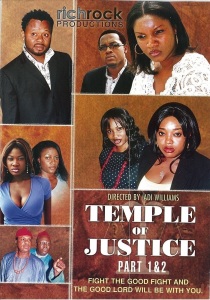
Richrock Production presents, Ormotola Jolade Ekeinde (Kamsi), Mercy Johnson (Nkechi), Ahley Nwosu (Chief), Nonso Diobi (Silver), Benedict Johnson (Uche), Evelyn Evelyn (Anabel); Story, Richmond Ezihe; Screenplay, Adim Williams; Photography, Kester Onuigbo; Producer, Richmond Ezihe; Director, Adim Williams.
“Temple of Justice” is a story in a different realm all by itself. The type of story when one has to step up to the plate and defend her belief against her environment and does not care if she ever went against the grain of her society. Doing what she does and her belief as she has are her only weapons. To stand against the mores of her society is a tall order counting on the idiosyncrasies of the African traditional society, and especially so the orthodox yoruba norms.
This is the type of movie that exposes the follies and failures of African social institutions. The story type that stands with the grooms against paying a number of cattle heads for their brides, or on the sides of the brides against paying back the ten cattle heads to the grooms after divorce; the type that will fuss and fight against genital mutilations in African. Let me present to you my heroine, a young spinster barrister at law Ormotola Jolade Ekeinde (Kamsi).
First, the memorable theme music: I’ve been used and been abused/ I don come to liberate the oppressed/ My people don’t you worry/ I don come to free you from your worries;I done come to put smile on the face of widows….
Then enters the spinster barrister, listening to her first case of a widow whose stepchildren have taken over all what is left of their dead father’s properties. She’s able to psych them out of the property by arbitration. Then comes another case which ends in court and even brings her notoriety and prominence: A widow’s brother-in-law claims all that his brother left and evicts his brother’s widow and two kids onto the streets. She wins the case, and the woman is granted ownership of all her husband’s properties. The media takes her popularity to the people and to the streets.
Her crusade for the disenfranchised, used and abused women in her society hit her shores when a philanthropist Ahley Nwosu (Chief) , who had donated 2 million naira to her non-profit organization, and a father of her intended husband, contrived and connived in the murder of his best friend for acres of land he had interest in.
“Temple of Justice” is a movie with social theme. Social themes don’t actually criticize the institutions but try to correct the ills of it. More or less this is a social commentary of what might be going on in our locales. Lots of such issues are placed in the story but are not given the time and place. The issue of the barrister’s sister is one, and the intended father-in-law cutting a check to pay off his mistress who has spent five years of her life with him in common law marriage.
In this type of movie, we’re interested in the lead player, in this sense, the barrister who extends beyond common representation of her clients but throws light on the gross abuse of power over women and the poor in our societies. After watching this movie, and in considering human behavior along the lines of man and wife with regard to widows, this movie’ll have a hold on you. Somehow!
